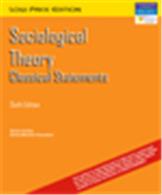Sociological Theory Classical Statements

|
Author(s):
Author:
David Ashley
- ISBN:9788131716212
- 10 Digit ISBN:813171621X
-
Price:Rs. 960.00
- Pages:496
- Imprint:Pearson Education
- Binding:Paperback
- Status:Available
-
|
This text provides a comprehensive examination of classical sociological theory by introducing students to the life, times, and ideas of the figures who have had the greatest influence on the development of the field. Each chapter focuses on one theorist and his ideas, organized into a social and historical perspective. Students will enjoy reading the background information on each theorist covered in the book. Taking a critical and reflexive approach, the text also discusses how classical theory affects sociology today.
Table of Content
- Ideology, History, and Classical Sociological Theory.
- The Nature and Types of Sociological Theory.
- (Isidore) Auguste Marie François-Xavier Comte.
- (David) Emile Durkheim.
- Herbert Spencer.
- Georg Wilhelm Friedrich Hegel.
- Karl Marx.
- Max Weber.
- Georg Simmel.
- Sigmund Freud.
- Vilfredo Pareto.
- Thorstein Bunde Veblen.
- George Herbert Mead.
- Friedrich Wilhelm Nietzsche.
- The Paradoxical Failure of Classical Sociological Theory: A Concluding Essay.
|
Salient Features
- Both authors are prominent scholars of sociological theory.
- Offers a balanced treatment of all the major classical theorists.
- Puts classical sociological theory into historical, social, and cultural context to show how theorists were responding to the issues and concerns of their time.
- Includes annotated bibliographies, biographical sketches, and glossaries for each theorist covered.
- The concluding chapter offers an evaluation of the achievements and limitations of classical theory, and of the relevance of classical theory in a postmodern age.
- Addresses issues of gender, race, and class on the development of classical theory in Chapter 1.
- Divides the theories discussed into Positivism/Interpretive theory and Critical theory throughout in order to help students understand the diversity of theoretical perspectives.
|
|
|
|
|